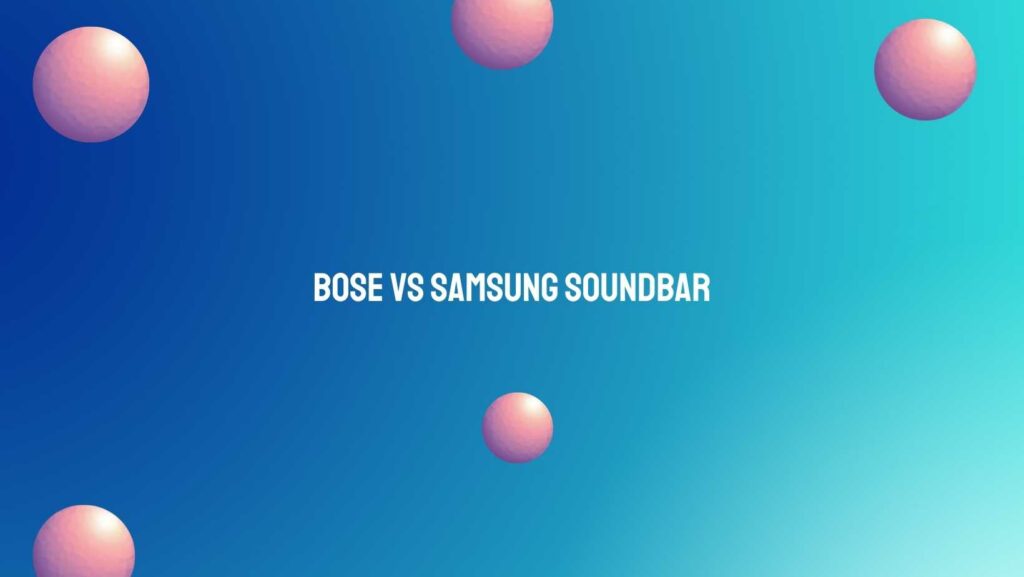Soundbars have become an integral part of modern home entertainment systems, offering an easy and efficient way to elevate audio quality for movies, music, and TV shows. When it comes to soundbars, Bose and Samsung are well-respected names in the industry, known for their innovative solutions. In this comprehensive comparison, we’ll take a deep dive into the Bose and Samsung soundbars, evaluating their features, sound quality, design, connectivity options, and overall value for money. By the end of this article, you’ll be better equipped to choose the soundbar that suits your audio preferences and needs.
Bose is renowned for its audio quality and innovation, and their soundbars live up to these expectations. Let’s explore some key features:
- Sound Quality: Bose soundbars are celebrated for their sound quality. They provide impressive sound clarity, a wide soundstage, and balanced bass, ensuring a captivating listening experience.
- Voice Control: Many Bose soundbars support voice assistants like Google Assistant and Amazon Alexa, making it convenient to control your music and smart home devices with voice commands.
- Connectivity: Bose soundbars typically offer HDMI ARC and eARC support for seamless integration with your TV and other devices. They also support wireless streaming via Bluetooth and Wi-Fi.
- Design: Bose products are known for their premium build quality and aesthetics. Bose soundbars are designed with a sleek and elegant appearance, making them an attractive addition to your home entertainment setup.
- Bose Music App: The Bose Music app provides a user-friendly interface for controlling your music, settings, and even creating a multi-room audio setup.
Samsung, a leading electronics manufacturer, offers a range of soundbars with features tailored to enhance your audio experience. Here are key features of Samsung soundbars:
- Sound Quality: Samsung soundbars deliver powerful sound with impressive clarity. They often come with wireless subwoofers for enhanced bass and a more immersive experience.
- Voice Control: Many Samsung soundbars also offer voice assistant support, with compatibility for Bixby and even integration with Samsung’s SmartThings platform for controlling smart home devices.
- Connectivity: Samsung soundbars are equipped with HDMI ARC and eARC, ensuring seamless TV connectivity. They also provide Bluetooth and Wi-Fi for wireless audio streaming.
- Design: Samsung soundbars are designed to complement modern home aesthetics, with sleek and contemporary looks.
- SmartThings App: The SmartThings app offers control over Samsung soundbars, along with other smart home devices in your ecosystem, providing a convenient, centralized hub.
Comparison
Let’s compare Bose and Samsung soundbars based on several key factors:
- Sound Quality: Bose soundbars are renowned for their exceptional sound quality, offering wide soundstages, clarity, and balanced bass. Samsung soundbars also provide good sound quality but may have slight variations in their audio profiles.
- Voice Control: Both brands offer voice assistant support, with compatibility for Google Assistant and Amazon Alexa. Samsung additionally integrates with Bixby and the SmartThings platform.
- Connectivity: Both brands provide HDMI ARC and eARC, ensuring compatibility with modern TVs. They also offer Bluetooth and Wi-Fi for wireless audio streaming.
- Design: Design is a matter of personal preference, but both Bose and Samsung soundbars are known for their sleek and modern aesthetics.
- Control Apps: Bose uses the Bose Music app for soundbar control, while Samsung employs the SmartThings app for soundbar and smart home device management.
- Price: Pricing varies, and it’s essential to consider your budget when choosing between Bose and Samsung soundbars. Bose products often come with a premium price tag, while Samsung offers a range of options at different price points.
Conclusion
Bose and Samsung both offer high-quality soundbars with their unique strengths. Bose is recognized for its exceptional audio quality and sleek design, along with the user-friendly Bose Music app. Samsung, on the other hand, delivers impressive sound quality, compatibility with multiple voice assistants, and integration into the broader Samsung ecosystem through the SmartThings platform.
Your choice between Bose and Samsung soundbars will largely depend on your audio preferences, room size, design aesthetics, budget, and brand affinity. Carefully consider which features align best with your specific audio needs to make the right decision. Ultimately, both brands provide soundbars that can enhance your home audio experience, ensuring that you enjoy your favorite content to the fullest.


